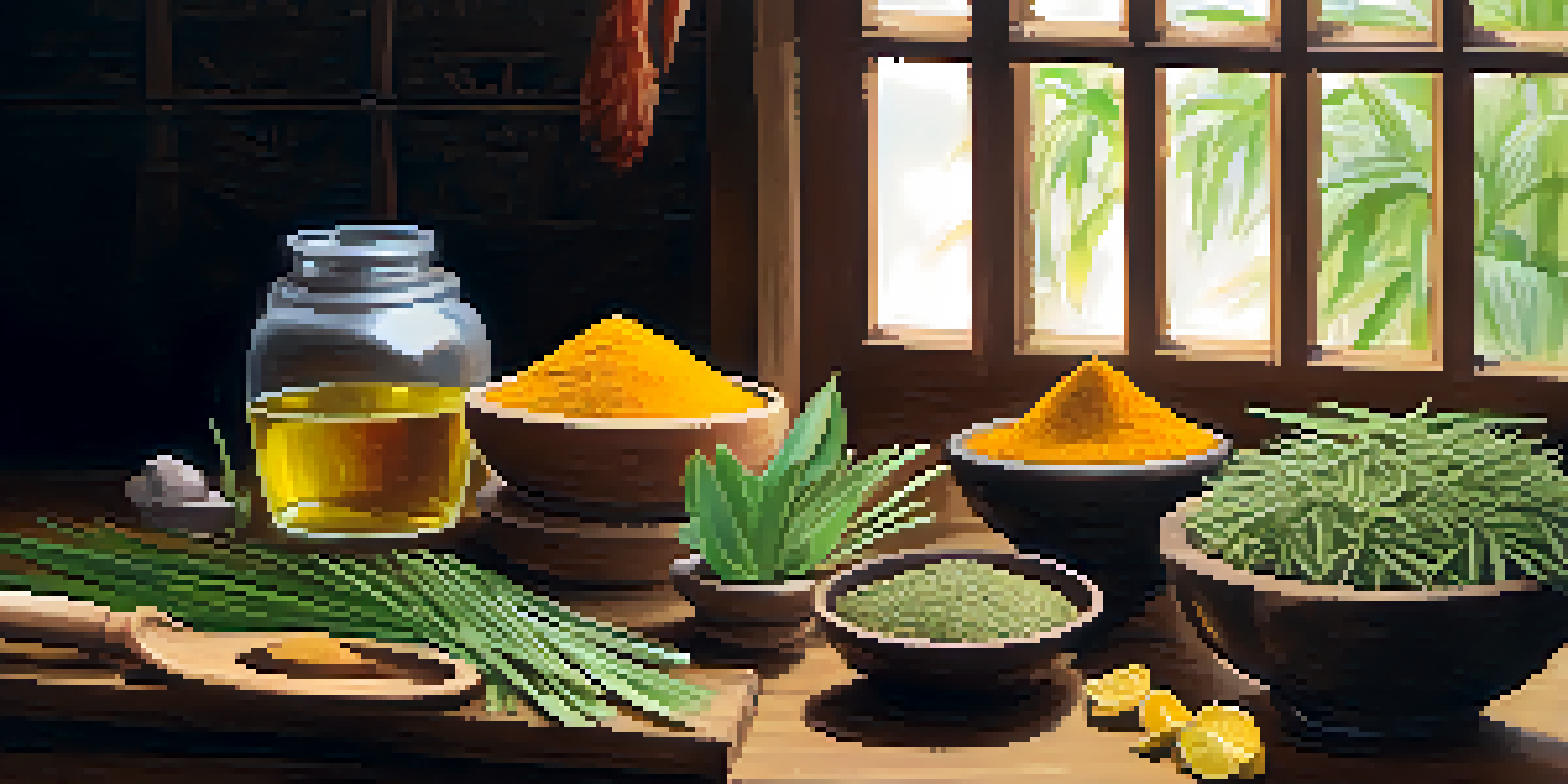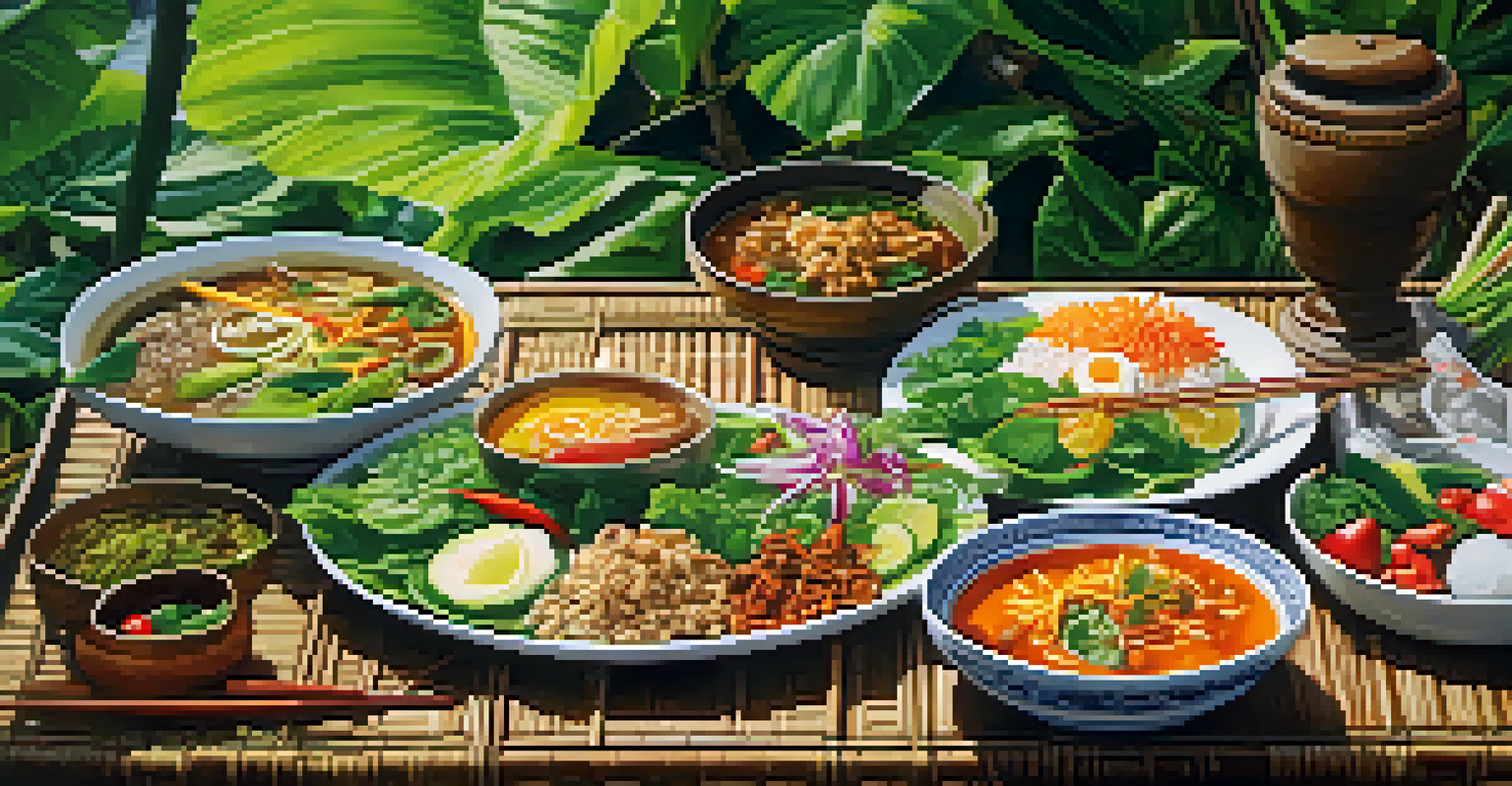Understanding the Foundations of Traditional Thai Medicine

What is Traditional Thai Medicine and Its Origins?
Traditional Thai Medicine (TTM) is an ancient healing system that has been practiced for over 2,500 years. Rooted in a rich tapestry of Buddhist philosophy, Ayurveda, and Chinese medicine, TTM emphasizes a holistic approach to health. This means treating the body, mind, and spirit as interconnected entities rather than isolated parts.
The greatest wealth is health.
The origins of TTM can be traced back to the time when Thai people began to combine indigenous healing practices with influences from neighboring cultures. This melding produced a unique system that not only focuses on physical ailments but also considers emotional and spiritual well-being. This historical context provides a deeper understanding of how TTM has evolved over time.
Today, TTM is recognized worldwide, blending traditional practices like herbal medicine, massage, and dietary therapy with modern healthcare approaches. As more people seek natural remedies and holistic care, the principles of TTM are becoming increasingly relevant in our fast-paced world.
Key Principles of Traditional Thai Medicine
At the heart of TTM are several key principles that guide its practice. One of the most fundamental is the concept of 'sangha,' which refers to the balance of body, mind, and spirit. When these elements are in harmony, individuals experience optimal health. Understanding this balance is essential for anyone looking to explore TTM.

Another important principle is the idea of 'lom,' or energy flow, in the body. TTM practitioners believe that blockages in this energy flow can lead to illness. Thus, treatments often focus on restoring this flow through techniques like Thai massage and acupressure, which help release tension and promote relaxation.
Holistic Approach to Healing
Traditional Thai Medicine emphasizes treating the interconnectedness of body, mind, and spirit for optimal health.
Furthermore, TTM emphasizes preventive care. Instead of waiting for illness to occur, practitioners encourage lifestyle changes, dietary adjustments, and regular physical activity to maintain health. This proactive approach encourages individuals to take charge of their well-being, fostering a sense of empowerment.
The Role of Herbal Medicine in TTM
Herbal medicine is a cornerstone of Traditional Thai Medicine, utilizing a diverse range of plants and herbs for healing purposes. Each herb is selected for its unique properties and the specific conditions it addresses, creating a tailored approach to treatment. This personalized aspect of herbal medicine is one of its greatest strengths.
Healing is a matter of time, but it is sometimes also a matter of opportunity.
For instance, turmeric is commonly used not just for its flavor but for its anti-inflammatory properties. Similarly, ginger is revered for its ability to aid digestion and boost immunity. By understanding the benefits of these herbs, practitioners can create remedies that support the body's natural healing processes.
Moreover, the preparation and application of herbal remedies can vary significantly, including teas, poultices, and oils. This versatility allows for creativity in treatment, making it accessible for various ailments. As a result, herbal medicine remains a vital component of TTM, bridging ancient wisdom with contemporary health needs.
Understanding Thai Massage and Its Healing Benefits
Thai massage is perhaps one of the most recognized aspects of Traditional Thai Medicine. Unlike other massage techniques that focus primarily on relaxation, Thai massage is a dynamic practice that incorporates stretching, acupressure, and yoga-like movements. This holistic approach not only targets muscle tension but also enhances flexibility and energy flow.
During a typical session, a practitioner uses their hands, feet, and body weight to apply pressure along the body's energy lines, known as 'sen.' This manipulative technique can alleviate pain, reduce stress, and promote overall well-being. Many people who experience Thai massage often describe a sense of lightness and rejuvenation afterward.
Role of Herbal Medicine
Herbal medicine is a cornerstone of TTM, utilizing various plants to create tailored treatments that promote healing.
Importantly, Thai massage is not just about physical relief; it also fosters mental clarity and emotional balance. By addressing both body and mind, it aligns with the core philosophies of TTM, reinforcing the idea that true health encompasses all aspects of life. As such, it serves as a powerful tool for maintaining holistic well-being.
Dietary Practices in Traditional Thai Medicine
Diet plays a crucial role in Traditional Thai Medicine, with practitioners emphasizing the importance of nutrition in maintaining health. TTM views food not just as sustenance but as medicine, where the right choices can prevent illness and promote healing. This perspective encourages individuals to be mindful of what they consume.
In TTM, foods are categorized based on their properties and effects on the body. For example, warming foods like garlic and ginger are thought to stimulate digestion, while cooling foods like cucumbers and melons help balance heat in the body. This categorization assists individuals in selecting foods that align with their current health needs.
Furthermore, the practice of mindful eating is encouraged, which involves paying attention to the flavors, textures, and feelings associated with food. This approach fosters a deeper connection to one's body and health, promoting a holistic understanding of nutrition. Ultimately, dietary practices in TTM highlight the synergy between food and health.
The Influence of Spirituality in TTM
Spirituality plays a significant role in Traditional Thai Medicine, where healing is viewed as a journey that encompasses physical, emotional, and spiritual dimensions. Many practitioners integrate Buddhist principles into their healing practices, emphasizing mindfulness, compassion, and the interconnectedness of all life. This spiritual foundation enhances the effectiveness of TTM treatments.
Meditation and mindfulness practices are often encouraged as part of the healing process. These techniques help individuals cultivate inner peace and clarity, which are essential for promoting overall health. By addressing the mind and spirit, TTM practitioners believe that true healing can occur, leading to lasting wellness.
Integration with Modern Health
TTM is gaining recognition in modern healthcare, highlighting the benefits of blending traditional practices with conventional treatments.
Moreover, rituals and ceremonies may accompany certain treatments, reinforcing the spiritual aspect of TTM. These practices honor the deep cultural roots of Thai healing traditions and create a space for personal reflection and growth. By embracing spirituality, TTM offers a more holistic path to health.
The Future of Traditional Thai Medicine in Modern Healthcare
As the world increasingly embraces holistic approaches to health, Traditional Thai Medicine is gaining recognition within modern healthcare systems. Many practitioners and patients are discovering the benefits of integrating TTM with conventional treatments, creating a more comprehensive approach to wellness. This trend reflects a growing appreciation for ancient wisdom in contemporary settings.
Research into the efficacy of TTM practices, such as Thai massage and herbal treatments, is expanding. As studies highlight their benefits, more healthcare providers are open to collaborating with TTM practitioners. This integration not only enriches patient care but also fosters a greater understanding of diverse healing modalities.

However, challenges remain, particularly in standardizing practices and ensuring quality control in herbal medicine. As TTM continues to evolve, finding a balance between tradition and modernity will be essential. The future of TTM looks promising as it seeks to bridge the gap between ancient practices and contemporary health needs.